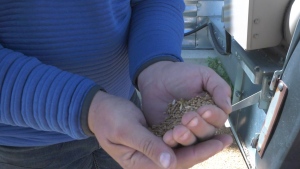A potentially harmful algae bloom has been discovered in a northern lake, raising concerns for the local community and environment.
According to reports, the algae bloom was first noticed by a group of local fishermen who were out on the lake. They immediately reported their findings to the authorities, who then conducted further investigations.
The algae bloom, also known as cyanobacteria, is a type of bacteria that can produce toxins harmful to humans and animals. It can also deplete oxygen levels in the water, leading to the death of aquatic life.
Experts have stated that the presence of this algae bloom is likely due to the warm weather and excess nutrients in the lake, such as phosphorus and nitrogen. These nutrients can come from various sources, including agricultural runoff and sewage.
The discovery of this algae bloom has raised concerns for the safety of the lake and its surrounding areas. The local community relies on the lake for recreational activities, and the potential health risks posed by the algae bloom could have a significant impact on their livelihoods.
In response to the situation, the authorities have issued a warning to the public to avoid contact with the water and to keep their pets away from the lake. They have also advised against consuming fish caught in the affected area.
Efforts are currently underway to monitor and contain the algae bloom. The authorities are working closely with environmental agencies to determine the best course of action to address the issue.
In the meantime, residents are urged to remain vigilant and report any further sightings of the algae bloom to the authorities. It is essential to take precautionary measures to ensure the safety of both humans and the environment.
This discovery serves as a reminder of the importance of protecting our water sources and being mindful of our actions that can contribute to the growth of harmful algae blooms. Let us all work together to preserve the health and well-being of our lakes and communities.



